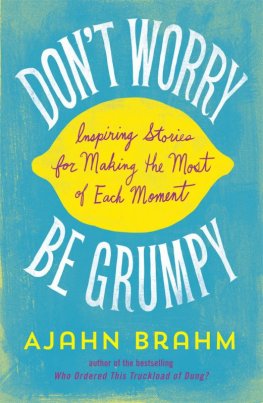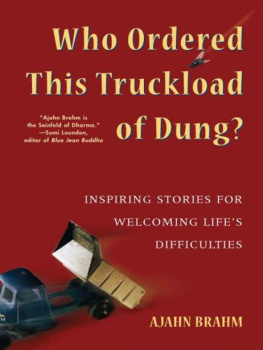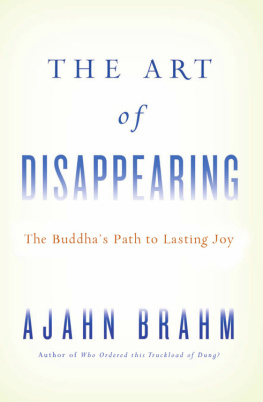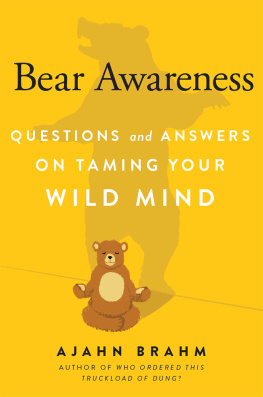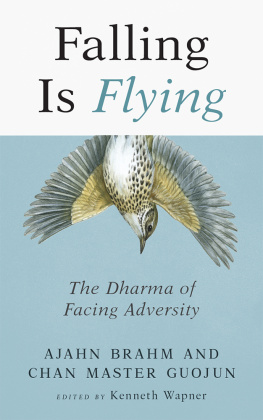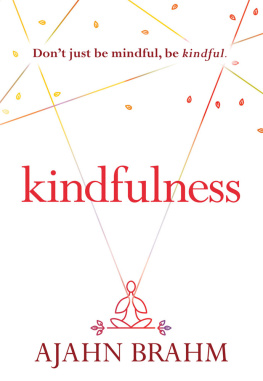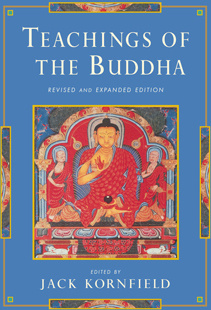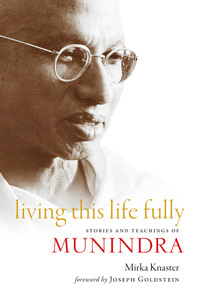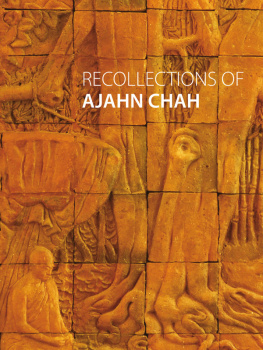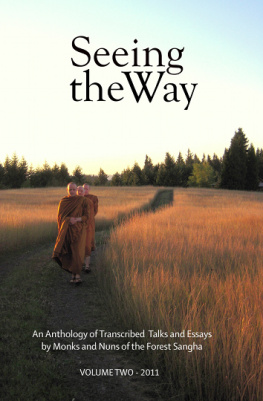
Dont Worry, Be Grumpy
by
Ajahn Brahm
LAUGU ALOUD AS YOU LOOK AT LIFE A NEW WITH 108 STORIES FROM THE BESTSELLING AUTHOR OF WHO ORDERED THIS TRUCKLOAD OF DUNG?
If a picture is worth a thousand words, then a good metaphorical story is worth that many more. Ajahn Brahms latest collection is funny, endearing, and, of course, infused with wisdom.
Arnie Kozak, author of Wild Chickens and Petty TyrantsI love a book that I can open randomly to any page and know Ill find a valuable teaching. With every story, the irrepressible Ajahn Brahm gently challenges our conventional views, giving us a fresh perspective imbued with wisdom and compassion.
Toni Bernhard, author of How to Wake UpIn irreverent and inescapably humorous ways, Ajahn Brahms stories become unforgettable learning experiences.
Jean Smith, author of Now: The Art of Being Truly Present The Author
In these brief stories Ajahn Brahm offers up timeless wisdom that will speak to people from all walks of life. Drawing from his own experiences, stories shared by his students, and old chestnuts delivered with a fresh twist, Ajahn Brahm delights even as he surprises us with unexpected depth and inspiration.

A Buddhist monk for over thirty years, Ajahn Brahm is the abbot and spiritual director of the Buddhist Society of Western Australia. He is in demand worldwide as both a spiritual teacher and popular speaker. His previous books include Who Ordered This Truckload of Dung? The Art of Disappearing, and Mindfulness, Bliss, and Beyond.
Preface
Bananas are profound
They are so commonplace we think we know everything about them. In fact, we dont even know the correct way to peel a banana! Most people peel the banana from the stalk. However, monkeys, the experts on bananas, always hold the stalk and peel their bananas from the opposite end. Try it and see. Youll find it much less troublesome following the monkey method.
In the same way, meditating Buddhist monks and nuns are experts on separating the mind from the difficulties that surround it. I invite you to follow the monk method of dealing with lifes problems. Like with peeling a banana, youll find life much less troublesome.
The Container and the Contents
There were riots in the streets some years ago after a guard at Guantanamo Bay was accused of taking a holy book and flushing it down the toilet.
The next day, I took a call from a local journalist who told me he was writing an article about the outrage by asking leaders of all the major religions in Australia the same question he was about to ask me.
What would you do, Ajahn Brahm, if someone took a Buddhist holy book and flushed it down your toilet?
Without hesitation I answered, Sir, if someone took a Buddhist holy book and flushed it down my toilet, the first thing I would do is call a plumber!
When the journalist finished laughing, he confided that that was the first sensible answer he had received.
Then I went further.
I explained that someone may blow up many statues of the Buddha, burn down Buddhist temples, or kill Buddhist monks and nuns; they may destroy all this, but I will never allow them to destroy Buddhism. You may flush a holy book down the toilet, but I will never let you flush forgiveness, peace, and compassion down the toilet.
The book is not the religion. Nor is the statue, the building, or the priest. These are only the containers.
What does the book teach us? What does the statue represent? What qualities are the priests supposed to embody? These are the contents.
When we recognize the difference between the container and the contents, then we will preserve the contents even when the container is being destroyed.
We can print more books, build more temples and statues, and even train more monks and nuns, but when we lose our love and respect for others and ourselves and replace it with violence, then the whole religion has gone down the toilet.
The abbot woke up early one morning. Nothing unusual in that. But this morning he was awakened by the sound of something moving in the nearby shrine room. That was unusual because most of his monks would normally be practicing their morning chanting at this time (Zzzzzz) so he went to investigate.
In the darkness he saw a silhouette of a hooded figure. It was a burglar.
What do you want, my friend? said the abbot kindly.
Gimme the key to the donation box, punk! said the burglar brandishing a long, sharp knife.
The abbot saw the weapon but felt no fear. He felt only compassion for the young man.
Certainly, he said, slowly handing over the key.
As the thief frantically emptied the box of cash, the abbot noticed the robbers jacket was torn, his face pale and gaunt.
When was the last time you have eaten, dear boy?
Shuddup! barked the burglar.
Youll find some food in the cupboard next to the donation box. Help yourself.
The thief paused a moment in confusion. He was taken aback by the abbots consideration for his welfare. Still, pointing the knife at the monk just in case, he hurriedly filled his pockets with cash from the donation box and food from the cupboard.
And dont call the cops, or else! he shouted.
Why should I call the police? answered the abbot calmly. Those donations are to help poor people like you, and I have freely given you the food. You have stolen nothing. Go in peace.
The next day, the abbot explained what had happened to his fellow monks and to his lay committee. They were all very proud of their abbot.
A few days later, the abbot read in the newspaper that the burglar had been caught robbing another house. This time he was sentenced to ten years in jail.
Just over ten years later, the same abbot was woken up early in the morning by the sound of someone in the shrine room. He got up to investigate and, yes youve guessed it, he saw the old burglar standing next to the donation box carrying a sharp knife.
Remember me? shouted the burglar.
Yes, groaned the abbot reaching into his pocket. Heres the key.
Then the burglar smiled, put down the knife, and said gently, Sir, put away the key. I couldnt stop thinking about you all those long days in prison. You were the only person in my entire life who was kind to me, who actually cared about me. Yes, I have come back to steal again, but I realized that last time I took the wrong thing. This time I have come to take your secret of kindness and inner peace. That is what I really wanted in the first place. Please hand over the key to compassion. Make me your disciple.
Soon after, the thief became a monk and became rich beyond his wildest dreams. Not with money, but with a wealth of kindness and inner peace. That is what we all really want. What a steal!
During a teaching trip to North America, I taught the following inspirational metaphor:
When you step into some dog shit, dont get annoyed and wipe it off your shoes. Smile instead and take it back home. There you can scrape off the dog poo under the apple tree in your garden. Next year, those apples will be more plentiful, juicy, and sweet than ever before. But you must remember that when you bite into that succulent apple, what you are really eating is the dog shit! Only now it has been transformed into juicy, sweet apple.
Next page
